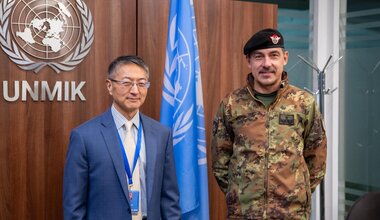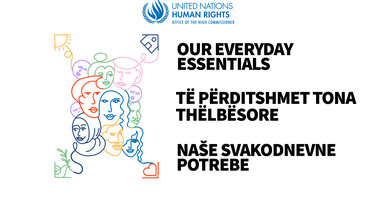10 Feb
2014
SRSG Presentation to the Security Council - 10 February 2014
Madam President, Excellencies,
I wish to begin my first briefing to you in 2014 by taking note of the remarkable progress achieved during 2013. It was a year of significant changes as well as political progress...
I wish to begin my first briefing to you in 2014 by taking note of the remarkable progress achieved during 2013. It was a year of significant changes as well as political progress...
Madam President, Excellencies,
I wish to begin my first briefing to you in 2014 by taking note of the remarkable progress achieved during 2013. It was a year of significant changes as well as political progress, in particular through the historic achievement last April of the “First agreement of principles governing the normalisation of relations between Belgrade and Pristina”.
An essential basis for this progress has been an increased level of mutual confidence and direct communication between the parties, which has been sustained regardless of the disagreements and disputes over the details of implementation. I once again wish to recognize the two prime ministers for their ongoing efforts at reconciliation and confidence building, commendably facilitated by EU High Representative Ashton.
Since my last briefing to you, several additional concrete steps have already been completed successfully. By the end of this reporting period, some 80 former Serbian police officers had completed their induction and transition to the Kosovo police. In just a few weeks since then, this number has now grown to a total of 142 officers, who have already been deployed for active duty in the northern regional command. It is expected that some 100 additional officers would complete their induction and assume duties in the North by the end of this week.
Implementation of the terms agreed regarding the judiciary in northern Kosovo has not been completed, although some progress was made during the most recent high level discussions in Brussels on 27 January. Both parties should be urged to move expeditiously to bring this discussion to conclusion, hopefully during their 22nd round of high-level talks, scheduled for the day after tomorrow in Brussels. Flexibility should be demonstrated by both sides on such future arrangements as would ensure maximum access to justice and promote broad public confidence in the system.
Building greater confidence in the police and judiciary throughout Kosovo is of the highest importance, especially as implementation proceeds in northern Kosovo.
Two recent, as-yet unsolved cases, only underscore this importance. On 16 January 2014, one of the newly elected members of the North Mitrovica municipal assembly, Dimitrije Janicijevic, was killed near his home. Although the motive remains unknown, the murder followed repeated violent attacks on the same individual and his property in recent years. The deplorable killing last September of a Lithuanian EULEX official, Audrius Šenavicius, in a cowardly attack on a EULEX convoy remains unsolved. Regardless of the circumstances and background of these and other major crimes, so long as they remain unsolved, they will continue negatively to affect perceptions of insecurity, and impunity for the perpetrators and those who support and protect them. Active cooperation by all in solving these cases is essential for normalising the situation in northern Kosovo.
Implementation of other agreements has meanwhile moved forward in several areas.
In November, regular information exchange started between the respective revenue authorities via the European Commission's System for Exchange of Excise Data, fulfilling a joint commitment made by the parties. On 14 December, collection of duties commenced at the two main northern crossing points. This followed further agreement on the management of funds collected there through a special account.
In November, regular information exchange started between the respective revenue authorities via the European Commission's System for Exchange of Excise Data, fulfilling a joint commitment made by the parties. On 14 December, collection of duties commenced at the two main northern crossing points. This followed further agreement on the management of funds collected there through a special account.
Most recently, on 24 January, Belgrade handed over a first batch of digitized cadastral records to Pristina, through the European Union. This marked the start of a comprehensive comparison and reconciliation of Kosovo property records- the first since the end of the conflict.
Madam President,
Despite the overall successful conduct of Kosovo local elections, we have witnessed a slower pace in the establishment of new administrations in northern Kosovo municipalities. Indeed, the inaugurations of newly-elected municipal councils were finally held on 11 January, the last day of the official deadline, after a series of postponements. At this very moment, during last hours of the deadline, municipal assemblies of the four northern municipalities are at session to discuss and adopt the statute of their assemblies. In the North Mitrovica municipality, the decision of the mayor-elect not to take the oath of office has necessitated a new mayoral election, which is scheduled for 23 February. In addition, the arrest, on 27 January, of a prominent local Kosovo Serb political leader and a candidate for the position of mayor in North Mitrovica, Oliver Ivanovic, on charges of war crimes and aggravated murder, triggered local tensions, leading to protests and public calls for his release, pending trial. This is indicative of the challenges and delicacy of the implementation of 19 April agreement.
While an important milestone will be reached with the full constitution of the municipal administrations, the establishment of a Community/Association of Serb-majority municipalities will represent another major step in the full implementation of the 19 April agreement. In order to ensure their effectiveness and sustainability, the new municipal administrations should be supported, both in terms of resources and political engagement, by all local and international stakeholders, through a well-coordinated assistance mechanism.
Indeed, the deep prevailing concerns among the local public in the north, over the implications of the ongoing political transitions on their daily lives, should be met by determined efforts to achieve visible progress in improving local infrastructure and delivery of public services, and ensuring reliable and responsive law enforcement.
High demands and expectations from the population are directed to the newly elected mayors and members of the municipal Councils. They will need early and firm support in order to fulfill reasonable expectations.
High demands and expectations from the population are directed to the newly elected mayors and members of the municipal Councils. They will need early and firm support in order to fulfill reasonable expectations.
Looking ahead, international engagement will be critical in enabling Kosovo Serbs to exercise their franchise in the early Serbian parliamentary elections on 16 March. Extensive discussions have also taken place among local Kosovo political actors on possible elections for the Kosovo Assembly and on the issue of electoral reform, with a view to ensuring greater transparency, simplicity and inclusiveness, including updating of the electoral lists. Some exchanges have also taken place on possible constitutional amendments, in particular related to the so-called “reserved” seats for the representatives of the minority communities. These discussions have not concluded at this time, but their results will be crucial in paving the way for a broader participation of Kosovo Serbs and other minorities in Kosovo’s legislative elections.
Speaking in the broader context of the international peace and security, and as this issue was raised within this Chamber, I wish to mention that a debate also took place within Kosovo on the participation of local residents in conflicts in other regions, such as Syria. Last week, the Kosovo authorities proposed to the Kosovo Assembly
a draft law, which would prohibit and criminalise participation of Kosovars in armed conflicts abroad.
a draft law, which would prohibit and criminalise participation of Kosovars in armed conflicts abroad.
As noted in the Secretary-General’s report, some progress is being made in the clarification of the fates of missing persons from the conflict with the discovery of human remains at a suspected mass grave site in Southern Serbia . Excavations, suspended for the winter, are due to resume in spring. However, far too many families on both sides still have no word on the fate of their missing loved ones. It is imperative that individuals and institutions, with any knowledge of the fate of the missing persons, come forward and help achieve closure of this painful chapter. Progress on this important matter, as well as finding an appropriate mechanism for compensating the aggrieved families, will certainly go a long way in facilitating greater reconciliation and integration among Kosovo communities, as well as furthering normalization of relations between Belgrade and Pristina.
Madam President,
Major developments have taken place during the past year, several of them breakthroughs on issues outstanding since the end of the conflict. The European perspective, as well as effective facilitation led by EU High Representative Ashton, have emerged as key instruments for political progress and for encouraging gradual
reform and modernisation of Kosovo's public institutions.
In December, the Council of the European Union noted the opening of negotiations for a Stabilization and Association Agreement with Kosovo, and took note of the intention of the European Commission to conclude the negotiations in the course of 2014. The Council also adopted the General EU position for the opening of accession negotiations with Serbia, and the first intergovernmental conference with Serbia was launched on 21 January. Within the broader context of progress by both parties in their respective relations with the European institutions, major European assistance to local projects and programmes in Kosovo will also clearly remain central. Moreover, bi-lateral donor assistance projects should be carefully coordinated with all other efforts on the ground. In this regard, UN agencies,
programmes, and funds are a ready and able partner to add value to this effort. On its part, UNMIK welcomes these processes, and will continue to be fully engaged in a coordinated effort, applying its resources and relations with all communities, to build up confidence on the ground.
It will be essential for Belgrade and Pristina to consolidate the historic progress achieved thus far, and to overcome, gradually but steadily, the many outstanding issues through dialogue. It is also my hope that members of this august Council, individually and collectively, welcome the pragmatic steps being taken by the parties toward normalization of their relations. Acknowledgment of the substantial progress achieved, and encouragement of further steps, will greatly strengthen the resolve of both sides in overcoming the remaining challenges to building a stable and peaceful future.
Madam President,
Allow me to conclude by thanking you and all members of the Council for your valuable engagement with the parties, and for your continuing support to the work of UNMIK.
Thank you.
 UN
UN United Nations Peacekeeping
United Nations Peacekeeping





